Tuesday, February 28, 2006
Goopers Attempt To Seek Cover for President in NSA Scandal
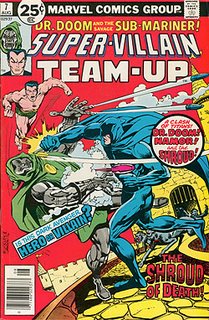
The Republicans--not usually known as soft on crime--are scrambling to pull the administration's fat from the frying pan by trying to retroactively legalize the extra-legal NSA warrantless eavesdropping program.
All the usual suspects make an appearance.
At 5 p.m. today, several Senate Republicans will huddle with Majority Leader Bill Frist (Tenn.) in hopes of loosening one of Congress's toughest knots: how to provide oversight of the Bush administration's domestic surveillance operations without impairing the ability to spy on possible terrorists.Frist wants to keep his caucus from fracturing over the issue now that Judiciary Committee Chairman Arlen Specter (Pa.) is proposing a bill that many fellow Republicans oppose. The White House, meanwhile, has signaled that it wants as little congressional meddling as possible.
The Specter bill is a pathetically weak cover-up attempt as it is, and these apologists are trying to make mockery of even that.
Specter is circulating language that would require the FISA judges to rule on the NSA program's constitutionality. Should it pass that test, it would operate under FISA guidelines. Specter's committee will hold a hearing on the program's constitutionality today.
Sen. Mike DeWine (R-Ohio) is pushing a rival plan that would keep the NSA program separate from FISA and provide a mechanism for oversight by a bipartisan band of House and Senate members.
"Keep the NSA program separate from FISA?"
The program is only separate from FISA in that the administration says so. A careful reading of law instructs otherwise. DeWine means to legalize what is currently illegal.
Some Republicans consider Specter's plan too restrictive and DeWine's too lenient. Frist's gathering of Republicans from the judiciary and intelligence committees today will seek a possible compromise, several sources said.
One idea, Sen. Lindsey O. Graham (R-S.C.) said yesterday, "would include statutory blessing of the current surveillance program, a limited but meaningful role for the FISA court and a warrant requirement" if there is reason to believe "an American citizen is collaborating with the enemy." The plan, which some call "DeWine plus," would not allow the FISA court to rule the NSA program unconstitutional, said Graham, a Judiciary Committee member.
That is having your cake and eating it too. Graham wishes to retroactively legalize the lawbreaking, and prevent the courts from declaring the program illegal.
Sheesh.
Intelligence committee member Olympia J. Snowe (R-Maine) hopes "there will be a way that aspects of Senator Specter's and Senator DeWine's legislation can be married," her spokeswoman, Antonia Ferrier, said.
Even if the Senate finds a middle path, it is unclear the House would follow. Intelligence committee Chairman Peter Hoekstra (R-Mich.) "has been pretty strong that the program does not need to fall under FISA, that the authority lies elsewhere," said his spokesman, Jamal Ware.
The voters in Hoekstra's district need to be "pretty strong" so that the administration's co-conspirator does not win re-election in the fall.
Taiwan Pushes Independence From China

After a recent thaw in China/Taiwan relations, Taiwan President Chen Shui-bian has decided now is the time to toy with the sensitive issue of pressing for full legal independence from the Communist China.
The Reds don't have much of a sense of humor about the Straits issue.
Defying warnings from China and the United States, Taiwan eliminated its National Unification Council on Monday and said that only the Taiwanese people can decide whether they want to rejoin the mainland...
China's government and Communist Party Taiwan affairs offices jointly condemned Chen's move as an incitement to tension. "Chen Shui-bian persists in pushing the radical route of Taiwanese independence and provoking confrontation and conflict within Taiwanese society and across the Taiwan Strait," they said in a statement Tuesday. "This will only bring disaster to Taiwanese society."
Even the Bush administration can see a potential foreign policy crisis here (not of it's own making this time).
The White House 10 days ago dispatched Dennis Wilder, an Asia specialist on the National Security Council staff, and Clifford Hart, who handles Taiwan affairs at the State Department, to Taipei for an unannounced meeting with Chen to press the U.S. case.Chen rejected the appeals, press reports said. He followed up last week by telling a visiting U.S. congressman, Rob Simmons (R-Conn.), that the council and guidelines were "absurd products of an absurd era."
Bush's family is well-known to be close to, and sensitive to the wishes of, Red China. President Bush's father, the first President Bush, was U.S. ambassador to China in the 1970's.
Monday, February 27, 2006
Will Mookie "Do The Right Thing"?

At least one influential Iraqi figure is doing nothing to calm fears that Iraq will decend further into civil war.
The sectarian crisis further raised the political and military prominence of Moqtada al-Sadr, the anti-American Shiite cleric whose black-clad Mahdi Army militiamen rolled out after Wednesday's mosque bombing.Sadr, who had been abroad meeting with Middle Eastern leaders, returned to Iraq Sunday and called on his followers to keep up the protests.
In stops in three cities, the black-turbaned cleric called for joint Shiite and Sunni demonstrations in Baghdad to demand the withdrawal of U.S. forces and to condemn attacks on mosques and all other "terrorist actions" in Iraq.
"No, no occupation," Sadr chanted before a crowd in Basra.
"You should unite and love each other," he said in remarks directed at Sunnis and Shiites, "so that Iraq will be safe away from the occupation."
Venezuela Threatens Oil Cutoff To USA

Tensions between Venezuela and the United States are continuing with a threat by the Venezuelan Oil Minister to halt shipments of oil to the U.S.
President Hugo Chavez's government has recently stepped up threats to cut off oil exports to the United States and sell Venezuelan-owned refineries there amid rising tensions with President George W. Bush's administration.
"If our country, our process, our constitution are attacked by the Bush administration, we are not going to send any more oil," Oil Minister Rafael Ramirez told the Ultimas Noticias daily in an interview. "We'll see then which of the two governments is able to manage this type of a situation better."
Venezuela exports about half its production of 3.2 million barrels a day to the United States, much of that refined and sold by the Venezuela-owned Citgo Petroleum Corp. Venezuela supplied 10 percent of U.S. oil imports in November, the latest month for which U.S. figures are available.
There are quality problems with the high-sulfur crude produced in Venezuela requiring special refineries which are mostly located in the United States.
The distance issue involved in shipping Venezuelan crude to Asia (the biggest prospective market) would be have to be an additional consideration before any such punitive action is taken by Chavez.
Sunday, February 26, 2006
More Specter Dumbshittery

Sen Arlen "Magic Bullet" Specter has come up with a novel idea: Let's write a law that brings Bush's extra-legal NSA warrantless eavesdropping under the FISA act.
That's kinda like writing legislation to bring exceeding the speed limit on the highways under the traffic laws.
Specter's proposal would bring the four-year-old NSA program under the authority of the court created by the 1978 Foreign Intelligence Surveillance Act. The act created a mechanism for obtaining warrants to wiretap domestic suspects. But President Bush, shortly after the 2001 terrorist attacks, authorized the NSA to eavesdrop on communications without such warrants. The program was revealed in news reports two months ago.
I bet he will want to make the provisions retroactive to spare Bush any legal consequences for having evaded FISA for the last few years.
There looks to be a problem or two with Sen. Specter's legislation:
The draft version of Specter's bill, which is circulating in intelligence and legal circles, would require the attorney general to seek the FISA court's approval for each planned NSA intercept under the program...
Specter's bill would require the attorney general to give the secret court "a statement of the facts and circumstances" causing the Justice Department to believe "that at least one of the participants in the communications to be intercepted . . . will be the foreign power or agent of a foreign power specified in [the law], or a person who has had communication with the foreign power or agent." The attorney general would have to provide "a detailed description of the nature of the information sought" and "an estimate of the number of communications to be intercepted . . . during the requested authorization period."
Even published information about the secret program has pointed out that the NSA is casting a hugely wide net. It will be impossible individually to truthfully provide "a statement of the facts and circumstances" for each suspect, not to mention provide a description of the information that they are trying to intercept.
Nobody must have told Specter. He certainly is not among the eight lawmakers who have been briefed on the program.
Kate Martin, director of the Center for National Security Studies, a civil rights group, said the bill's language is alarmingly broad. "It's not limited to al-Qaeda or even terrorism," she said. Those who communicate with "foreign powers" could include a vast array of innocent people, Martin said.
Specter must think that by eliminating "probable cause" from the requirements of FISA, he is helping to keep the nation safe.
I wonder how he will feel when the administration can't meet even his looser restrictions and continues the program sub rosa.
Saturday, February 25, 2006
GOP Leaders Back on the Bush Team
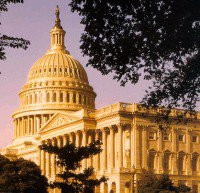
After a testy few days off the reservation, major Republicans are returning to support "our leader" on the Dubai ports deal.
A Dubai company's offer to delay taking control of terminal operations at six U.S. ports, combined with aggressive White House lobbying, has tempered a rush by congressional GOP leaders for quick action next week to block the $6.8 billion transaction, which has triggered a political furor.Speaker J. Dennis Hastert (R-Ill.) will meet with House GOP leaders Tuesday to discuss the chamber's next move, while aides to Senate Majority Leader Bill Frist (R-Tenn.) said he will wait to be briefed by the company before taking a stand. Both Hastert and Frist had issued strong statements earlier raising concerns about national security in the wake of Dubai Ports World's acquisition of the London-based Peninsular and Oriental Steam Navigation Co. and its terminal operations at six major U.S. ports, including those in New York and Baltimore.
But a bipartisan group of senators, who dismissed the Arab maritime company's offer late Thursday as meaningless, said yesterday that they will try to force a vote early next week on legislation that would require a 45-day national security investigation of the deal.
Senators from across the political spectrum -- including Charles E. Schumer (D-N.Y.), Norm Coleman (R-Minn.), Robert Menendez (D-N.J.), Olympia J. Snowe (R-Maine), Hillary Rodham Clinton (D-N.Y.), Tom Coburn (R-Okla.), Susan Collins (R-Maine) and Jack Reed (D-R.I.) -- said they will push for a fast vote on legislation that would block the takeover of port operations while the administration conducts a national security review of the transaction's implications.
The administration wishes any reticent lawmakers to view the report which immediately follows the one you are reading.
Any qualms about the national security ramifications of the deal will evaporate.
Or, at least, the administration hopes they will.
Intelligence Community Says UAE is a Team Player
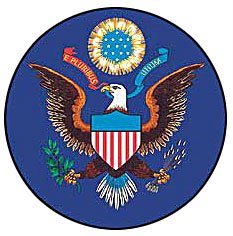
In the most reassuring thing I've heard in awhile, Walter Pincus tells us that the U.S. Intelligence Community has confidence that the Dubai Port deal will not endanger national security.
The Community's BFF Pincus has been told that since the UAE has been so helpful in the "war on terror", that they are now part of the club.
Reviews by U.S. intelligence agencies supported Dubai Ports World's purchase of the British company running terminals at six American seaports, and the assessments were made available to the Treasury Department-run interagency committee that approved the deal, according to senior administration officials.The intelligence studies were coordinated by the Intelligence Community Acquisition Risk Center, a new organization under the office of the Director of National Intelligence John D. Negroponte, said one official. The center normally does broad threat analyses of foreign commercial entities that seek to do business with U.S. intelligence agencies.
Pincus is saying that a small office that does cursory checks of IC databases on the backgrounds of foreign companies gives the plan the thumbs up.
While contents of the intelligence assessments remain classified, current and former intelligence officials yesterday spoke highly of the level of counterterrorism cooperation provided after Sept. 11, 2001, by Dubai and several of the other states that make up the United Arab Emirates.
A former senior CIA official recalled that, although money transfers from Dubai were used by the Sept. 11 hijackers, Dubai's security services "were one of the best in the UAE to work with" after the attacks. He said that once the agency moved against Pakistani nuclear scientist Abdul Qadeer Khan and his black-market sales of nuclear technology, "they helped facilitate the CIA's penetration of Khan's network."
What are the odds that the UAE will be glad to see that revelation in a major newspaper, even if untrue? (Which is likely.)
Dubai also assisted in the capture of al-Qaeda terrorists.Nice one. The proof:
An al-Qaeda statement released in Arabic in spring 2002 refers to UAE officials as wanting to "appease the Americans' wishes" including detaining "a number of Mujahideen," according to captured documents made available last week by the Combating Terrorism Center at West Point. The al-Qaeda statement threatened the UAE, saying that "you are an easier target than them; your homeland is exposed to us."
Anyone with a passing familiarity with al-Qaeda statements knows that most, if not all, of the Middle-Eastern nations collaborating with the U.S. in the "war on terror" have received the same type of boilerplate threats.
One intelligence official pointed out that when the U.S. Navy no longer made regular use of Yemen after the USS Cole was attacked in 2000, it moved its port calls for supplies and repairs to Dubai.
Marine Corps Gen. Peter Pace, chairman of the Joint Chiefs of Staff, on Tuesday praised the "superb" military-to-military relationship with the UAE, saying, "In everything that we have asked and work with them on, they have proven to be very, very solid partners."
This just tells us that if you play ball with the U.S. security regime, you will receive a payoff.
If Hugo Chavez entered the bidding for the British port management company P&O, beating out Dubai to buy the port operations, there is no way that he--with no ties to Muslim terrorists at all--would be the approved buyer.
The real issue anyway is the continued health of the U.S. dollar.
If the Arabs, who hold a huge portion of U.S. debt, get the idea that their dollar holdings don't have the buying power of everybody else's--they will unload their U.S. bond holdings--spelling doom for the dollar.
Update: My illustrious colleague at Swedish Meatballs Confidential, M1, has received information about the true motivation of the Bush administration in the Dubai Ports deal.
It involves allowing control of port management in the U.S. to be sold to a state-owned company in Dubai in exchange for U.S. oil companies being permitted to increase their stake in some UAE oil operations to majority ownership status.
See Swedish Meatballs Confidential
Friday, February 24, 2006
Former Senator Robert Dole Lobbies For Dubai Ports

Former Viagra spokesman Robert Dole has gotten himself a new gig.
The lobbying of former Senate majority leader Robert J. Dole on behalf of the Dubai-owned company set to take over management of terminals at six major U.S. seaports is creating a political problem for his wife, Sen. Elizabeth Dole (R-N.C.).Any possible influence Dole has would most likely be on the Congress.The chairman of the North Carolina Democratic Party, Jerry Meek, yesterday called on Sen. Dole to remove herself from "any congressional oversight" of the Dubai port deal. "The fact that Dubai is paying her husband to help pass the deal presents both a financial and ethical conflict of interest for Senator Dole," Meek said...
Dole's statement said he will confine his lobbying to the Bush administration. "I have not nor will I 'lobby' Members of Congress on this issue, not even at home," he wrote. "I have not discussed the port issue with any Senator or member of Congress or anyone working for the Congress, nor will I do so in the months to come."
The controversy confronting the Doles is an increasingly common one in Washington. According to Public Citizen's Congress Watch, at least three dozen members of Congress have relatives who are professional lobbyists.
Congress Watch and other watchdog groups have loudly criticized the growing trend. "What better way to buy access to a lawmaker than to hire the lawmaker's son, daughter or spouse as their lobbyist on a lucrative retainer?" said Craig Holman, a lobbyist for Congress Watch.
Since he will not be lobbying Congress, methinks that Dubai Ports may not be getting their money's worth.
Yoo Style Creative Lawyering
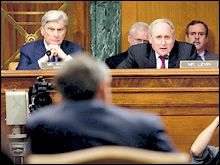
There was some seriously creative lawyering on display yesterday at the meeting of the Senate Armed Services Committee.
Yesterday, it emerged in the committee hearing that the administration may have skirted the law by not granting a 45-day review of the Dubai ports deal. The law says such a review is mandatory if a sale to a state-owned company "could affect the national security of the United States" -- a standard the administration seemed to acknowledge the deal met because it required special safeguards.Sen. Robert Byrd (D-W.Va.), who wrote the 1992 law, demanded to know "why that investigation was not carried out."
Warner asked Deputy Treasury Secretary Robert Kimmitt to "clarify."
"Senator," Kimmitt told Byrd, "we have a difference of opinion on the interpretation of your amendment." The administration, he said, views it "as being discretionary."
Sen. Hillary Rodham Clinton (D-N.Y.), reading the statute to Kimmitt, said the law "requires -- requires -- an investigation."
"We do not see it as mandatory," Kimmitt repeated.
Sen. Carl Levin (D-Mich.) grew irritated. "If you want the law changed," he told Kimmitt, "come to Congress and change it. But don't ignore it."
"We didn't ignore the law," Kimmitt again maintained. "We might interpret it differently."
Even Warner, though initially defending the administration, grew tired of this explanation. "I must say, as a lawyer myself, reading this, on the face, my colleagues raise a legitimate question," the chairman warned.
John Yoo's style of questionable interpretation of law seems to be felt all over Washington these days.
MZM's Wade Plans Guilty Plea in Cunningham Case

The Randy "Duke" Cunningham bribery scandal is claiming another scalp:
Washington defense contractor Mitchell J. Wade is expected to enter a guilty plea in federal court here this morning for his role in the bribery-related case involving former Rep. Randall "Duke" Cunningham (R-Calif.), according to sources familiar with the investigation.Wade, who founded District-based MZM Inc., started cooperating months ago in the inquiry of Cunningham's alleged trading of "earmarks" in congressional appropriations for $2.4 million in cash, furniture, boats and house payments, sources said. The probe began last June after the San Diego Union-Tribune reported that Wade bought Cunningham's San Diego home and then resold it months later for a $700,000 loss. A short time later, another newspaper reported that the congressman also was living rent-free on Wade's 42-foot yacht while in Washington...
Wade is also expected to acknowledge that he attempted to improperly influence a Defense Department contracting and procurement official with inducements and gifts, including offers to hire members of his family, the sources said.
The plea agreement will note also how Wade and his employees gave tens of thousands of dollars in campaign contributions to two other House members. There is no indication that the House members face any liability.
No liability?
That means Wade didn't get his money's worth from the two other House members.
Smart guys.
Thursday, February 23, 2006
The Odious Opinions of John Yoo

If John Yoo is so enamored with police state governance, he is welcome to emigrate to North Korea and work for the government there.
However, the North Korean dictatorship may be reluctant to embrace Yoo's theories of law. Kim Jong-Il may be the object of a "personality cult", but Yoo's interpretation of "supreme leadership" would even make Kim uneasy.
For generations, civics students have learned that the Constitution gives Congress the power to declare war. Yesterday, the man who built the legal underpinnings of the Bush administration's terrorism strategy revised the curriculum.John Yoo, the former Justice Department official whose writings justified the administration's treatment of military prisoners and the National Security Agency eavesdropping program, announced that Congress's warmaking powers are just a figment of the "popular imagination."
"Almost all the prominent scholars who believe that Congress should play a prominent role in foreign policy look to the 'declare war' clause as the source of Congress's power," Yoo said, 10 minutes into his talk at the Heritage Foundation. "They appeal to a very common-sense reading of the declare-war clause," he continued, and "I think in the popular imagination, declaring war does seem to equate with making war or starting war."
That is, indeed, the prevailing view. But it is not Yoo's. "I don't think if you look at the constitutional text carefully that it carries that expansive reach," he asserted. "Note that the declare-war clause uses the word 'declare.' It doesn't use the word 'begin,' 'make,' 'authorize,' 'wage' or 'commence' war."
Thus did Yoo reduce Congress's warmaking authority to a ceremonial role, much like its authority to declare a national Boy Scout recognition month...
Yoo has not mellowed in his view that presidential powers are near absolute in wartime. Twice yesterday, he said the president has a "choice" about whether to follow the 1978 Foreign Intelligence Surveillance Act -- the law that, critics say, President Bush evaded by allowing warrantless wiretaps. FISA "says, 'Look, you have a choice,' " Yoo said. "If you work through FISA, then you can use the fruits of those searches in criminal prosecution." By contrast, if a president "doesn't follow FISA and still collects the information, it's doubtful it will be admitted. That's a choice presidents have to make."
When a defendant gets dodgy legal advice, it doesn't mean that he escapes the legal consequences of his actions.
In a less fanciful country, the administration would have to face the fact that they should have hired less obsequious counsel.
Chickens Come Home To Roost For "Security" Party

The Republican insistence on identifying itself as the "security" party is paying unwelcome dividends to President Bush on the port management controversy.
The chickens are coming home to roost now with the constituents of Republican lawmakers making their fears known in Washington.
Faced with an unprecedented Republican revolt over national security, the White House disclosed yesterday that President Bush was unaware of a Middle Eastern company's planned takeover of operations at six U.S. seaports until recent days and promised to brief members of Congress more fully on the pending deal.But congressional Republicans renewed their vow to prevent the sale from being finalized next month and warned Bush, sometimes in taunting terms, that an overwhelming majority of lawmakers will oppose the sale on national security grounds. "Dear Mr President: In regards to selling American ports to the United Arab Emirates, not just NO but HELL NO!" Rep. Sue Myrick (R-N.C.) wrote to Bush in a one-sentence letter.
The unknown wingnuts in Congress are not alone in their objections.
Senate Majority Leader Bill Frist (R-Tenn.) and House Speaker J. Dennis Hastert (R-Ill.) rejected Bush's call to allow the sale to go through early next month and they remain committed to delaying it, their spokesmen said yesterday.
Republican lawmakers have been flooded with phone calls and letters from constituents encouraging them to fight Bush over the port deal, even at the expense of GOP unity on combating terrorism -- possibly their best political issue. As a result, Bush and Republicans are divided over a national security issue as never before and bracing for a possible showdown that could force Bush to either delay the sale or veto a Republican bill against it, according to congressional and White House officials.
I don't envy the congressional staffers getting an earful on the telephone from terrified red-staters.
House Homeland Security Committee Chairman Peter T. King (R-N.Y.) said political pressure from constituents is driving the debate. Lawmakers, he said, are "responding to incredible local political pressure."
The administration does have their apologists, note the following info:
At the Treasury Department, the Committee on Foreign Investments in the United States (CFIUS), which includes Cabinet officials and White House aides, examines sales with potential national security risks and usually attracts little attention.
Administration officials did not consider the sale of port terminal management to a Middle Eastern company dangerous or potentially controversial, White House aides said. Foreign-owned companies including a Chinese operation have controlled terminals at various U.S. ports for years -- and lawmakers have rarely complained. The White House said intelligence officials reviewed the sale and raised no concerns.
This seems to be all about money.
The rich in the U.S. have always had more in common with their wealthy foreign counterparts than they have with the average American citizen.
U.S. Wants India's Cooperation, While Offending Indian Scientific Community

In a diplomatic effort, the U.S. is attempting to get India to separate their military and civilian nuclear programs--to reduce the possibility of the diversion of U.S. made technology from energy programs to weapons programs.
Days before he leaves for South Asia, President Bush publicly urged India yesterday to separate its civilian and military nuclear programs to pave the way for a new strategic alliance between Washington and New Delhi.Bush agreed in July to give India access, for the first time, to civilian nuclear assistance, breaking with decades of U.S. nuclear policies. For the Bush administration, the deal was part of a long-term Asian strategy designed to accelerate India's rise as a global power and as a counterweight to China. The White House had hoped to finalize the accord next week when Bush becomes the first U.S. president to visit India and Pakistan since the two South Asian rivals conducted nuclear tests in 1998...
U.S. law forbids exporting nuclear materials to sites or facilities that are used for bombmaking. For Congress, the military-civilian separation plan is seen as a key indicator of whether New Delhi intends to use the deal to help its weapons production, or its energy sector.
The Indian military is not so keen about the U.S. idea:
In December, Indian negotiators surprised their U.S. colleagues when they proposed keeping a majority of the facilities under military control. In particular, the Indians suggested to senior U.S. officials, including Undersecretary of State R. Nicholas Burns, the chief negotiator, that they wanted military control over fast-breeder reactors, at least until 2010. The reactors are in the experimental phase but will be able to produce enormous quantities of weapons-grade plutonium when fully operational...
At a meeting last week of nuclear weapons experts, David Albright, president of the Institute for Science and International Security, suggested that India's plans for the breeder reactor were evidence of "a greedy effort to try to have as much of a plutonium production capability for nuclear weapons as possible."
"India has to choose," Albright said. "Does it want nuclear weapons capabilities, or does it want international cooperation?"
A decision two weeks ago by a U.S. consulate in India to refuse a visa to a prominent Indian scientist has triggered heated protests in that country and set off a major diplomatic flap on the eve of President Bush's first visit to India.
The incident has also caused embarrassment at the highest reaches of the American scientific establishment, which has worked to get the State Department to issue a visa to Goverdhan Mehta, who said the U.S. consulate in the south Indian city of Chennai told him that his expertise in chemistry was deemed a threat...
Mehta's case has especially angered Indians because he was a director of the Indian Institute of Science and is a science adviser to India's prime minister. He has visited the United States "dozens of times," he said, and the University of Florida in Gainesville had invited him to lecture at an international conference.
Are we worried now about Hindu terrorism?
Libby's Lawyers Using "Busy Official" Defense

Lawyers for I. Lewis "Scooter" Libby are using greymail tactics, requesting mountains of sensitive documents, to try to prove that their client had simply too much on his plate, and could have easily misremembered important details of the Valerie Plame affair.
Attorneys for I. Lewis "Scooter" Libby insist they need hundreds of pages of classified daily briefings prepared for President Bush to show that Libby did not intentionally lie about discussing Plame with reporters, as prosecutors allege. They contend that he was preoccupied with more serious matters when the conversations took place and when investigators questioned him months later.
"One of the central themes of Mr. Libby's defense at trial will be that any misstatements he made during his FBI interviews or grand jury testimony were not intentional, but rather the result of confusion, mistake or faulty memory," the lawyers wrote in a court document filed late Tuesday. "Given the urgent national security issues that commanded Mr. Libby's attention, it is understandable that he may have forgotten or misremembered relatively less significant events [such as] alleged snippets of conversations about Valerie Plame Wilson's employment status."...
Special Counsel Patrick J. Fitzgerald argued in court filings last week that Libby's attorneys were attempting to derail the prosecution with a "breathtaking" request for nearly a year's worth of Presidential Daily Briefs, the closely guarded document that summarizes threats to the United States and is almost never released.
There is at least one big problem with Libby's defense. Simple faulty memory cannot reasonably account for an elaborate story, the entirely ficticious account of being originally told of Plame's identity by Tim Russert.
Regular jurors will be able to tell the difference. The court will not look kindly on this either.
Wednesday, February 22, 2006
Libby Defense Fund Brims With Big Names

Looks like a bunch of influential Republicans may not want I. Lewis "Scooter" Libby to spill the beans on Vice-President Dick Cheney.
A Who's Who of Republican heavy hitters and Bush administration supporters are lending their names to help raise $5 million for the defense of Vice President Cheney's former top aide in his criminal trial.Led by Florida real estate magnate and former ambassador Mel Sembler, the group seeking to help I. Lewis "Scooter" Libby avoid jail time includes 26 notable names, many of whom could also be described as "Friends of George and Dick."
Sembler, a longtime party fundraiser, backed Cheney as a presidential candidate in 1996 until he dropped out of the race, and described himself as vindicated and thrilled when George W. Bush chose Cheney as a running mate in 2000...
Among Cheney's longtime friends on the committee are former senator Alan K. Simpson (Wyo.); GOP donor Frederic V. Malek of McLean, chairman of Thayer Capital Partners who served in the Nixon White House at the same time as Cheney; and top communications aide Mary Matalin. Former Bush energy secretary Spencer Abraham and former CIA director R. James Woolsey are also lending a hand...
The committee boasts academics, such as Bernard Lewis, Princeton history professor, and Francis Fukuyama of the School of Advanced International Studies at Johns Hopkins University, who has written critically of the administration's Iraq policy.
It must be nice to have such loyal friends.
FDA Carbon Monoxide Skullduggery

The FDA is resisting a push to ban the use of carbon monoxide to maintain the look of freshness in packaged meat.
A Food and Drug Administration official indicated yesterday that she was unaware of any scientific studies showing that the color of a piece of meat is central to a shopper's decision to buy it or not -- even though a petition recently filed with the agency describes several such studies.In a telephone news conference yesterday, Laura Tarantino, director of the FDA's Office of Food Additive Safety, sought to allay consumer concerns about the safety and freshness of the nation's meat supply after revelations in The Washington Post that a growing proportion of prepackaged meats in the United States are spiked with carbon monoxide -- a gas that keeps even rotten meat looking red and fresh.
The agency has been asked to ban the practice, but Tarantino defended the FDA's decision to classify it as "generally recognized as safe," which allowed the meatpacking industry to use the gas without seeking formal FDA approval.
Carbon monoxide "does not reduce the safety of meat," Tarantino said, referring to meat-company-sponsored studies indicating that treated meat is not more likely to harbor harmful bacteria than conventionally packaged meat.That aspect of safety is essentially undisputed. But Tarantino appeared unacquainted with a significant body of data -- some of it generated by the meat industry -- indicating that red color is a central cue used by shoppers to determine the freshness of meats, which are increasingly sold in sealed, "modified atmosphere" packages.
The issue is not just about buying preference here.
If the meat still looks good well after the consumer has purchased it, some people might go ahead and serve it up to their families, regardless of smell or slime considerations.
Not everyone in the U.S. is an Einstein.
BLM Diverting Biologists From Wildlife Studies

This really shows the influence of big energy upon the priorities of the Bush administration.
The Bureau of Land Management, caretaker of more land and wildlife than any federal agency, routinely restricts the ability of its own biologists to monitor wildlife damage caused by surging energy drilling on federal land, according to BLM officials and bureau documents.The officials and documents say that by keeping many wildlife biologists out of the field doing paperwork on new drilling permits and that by diverting agency money intended for wildlife conservation to energy programs, the BLM has compromised its ability to deal with the environmental consequences of the drilling boom it is encouraging on public lands.
Nice.
Tuesday, February 21, 2006
Good Work If You Can Get It

In the "it's good work if you can get it" department, today we present the business model of Brent Wilkes.
(T)he president of a small San Diego manufacturing company, showed a new acoustics technology he was developing to his neighbor, defense contractor Brent Wilkes. Wilkes soon came back with an unusual proposition.Wilkes said that Congress had set aside or "earmarked" $25 million in the military budget for the Navy to develop an acoustical system. He promised he could win the government contract to develop the system for Beck's Horizon Sports Technologies, according to allegations in a lawsuit. In return, Wilkes wanted $1.5 million up front to cover his lobbying expenses and a 51 percent interest in a new company they would set up to collect the government cash...
Although it is common for lobbying firms to charge clients large fees to pursue earmarks, Wilkes's demand for a majority interest in the resulting contract is highly unusual, experts said. "It has a strong, bad odor about it," said Kenneth A. Gross, a Washington lawyer who specializes in ethics law. He said many states, including California, have banned such contingency, or success, fees, though there is no federal prohibition.
"My client did nothing inappropriate or illegal in trying to obtain funding for his clients' projects," said Wilkes's attorney, Michael Lipman of San Diego.
Wilkes was an obscure California contractor and lobbyist until his name surfaced last year as one of two defense contractors alleged to have given Cunningham $2.4 million in cash and other benefits in return for Cunningham's steering government business their way. One of Wilkes's companies received more than $80 million in Pentagon contracts over the past decade that stemmed from earmarks that Cunningham slipped into spending bills.
Outstanding return on investment (ROI).
(Wilkes) expanded his business by setting up his own lobbying firm, Group W Advisors, in the Washington suburbs, to pursue earmarks.
State Dept. Punishing Dissenting Employees
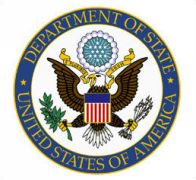
The State Department has been valued by policymakers for well over 200 years for providing as independent advice as you will find in this heavily politicized town.
That's what makes the following so egregious:
A State Department reorganization of analysts involved in preventing the spread of deadly weapons has spawned internal turmoil, with more than half a dozen career employees alleging in interviews that political appointees sought to punish long-term employees whose views they considered suspect...
"There are a number of disgruntled employees who feel they have been shoved aside for political purposes. That's true," said one of these (senior departmental) officials. "But there was rank insubordination on the part of these officers."
Rank insubordination? These officials didn't publicly call BS on the phony WMDs. I would call that loyalty.
About a dozen top experts on nonproliferation have left the department in recent months, with many citing the reorganization as a reason...
Some State Department officials privately acknowledge that they used to be thrilled by the department's reputation as a renegade in President Bush's first term, but they say the message has become clear in the past year that such attitudes are no longer acceptable...
The employees who say that they have been targeted once had a back channel to then-Secretary of State Colin L. Powell and his deputy, Richard L. Armitage, who they said would on occasion ask them to bypass their superior, John R. Bolton, now the ambassador to the United Nations. Bolton, with backing from allies in the Pentagon and the vice president's office, frequently battled the rest of the State Department on policy issues.
But (Robert Joseph, the undersecretary of state for arms control, who oversaw the reorganization), who worked for Rice at the White House, is an ideological soul mate of Bolton's and retained much of Bolton's staff -- and now officials say the policy disputes that characterized Powell's State Department have largely faded under Rice's tenure. The back channel that these employees used to alert senior management to their problems with Bolton no longer exists, the career officials said.
By many accounts, the decision to merge two key bureaus focusing on nonproliferation and arms control was necessary. The merger was originally approved by Powell, in his waning days as secretary, after the department's inspector general recommended combining the bureaus on the grounds of efficiency and workload. The IG said the nonproliferation bureau -- which seeks to deter the spread of weapons of mass destruction -- was overworked, and the arms-control bureau -- which negotiates and implements arms-control agreements -- was underworked. The IG also recommended that a third bureau, verification and compliance, be downsized.But once a panel of Joseph's top aides began implementing the plan, some of the IG's recommendations were set aside -- the verification bureau was expanded, not downsized, while officials in the arms-control bureau appeared to attain more authority. Both bureaus had appeared more in sync with the administration's views, officials said.
The dominant meme lately is that State is much more in the loop with the rest of the administration, and that they have a much greater say in U.S. policy under Rice than Powell.
Now we know why.
Intelligence Agencies Reclassifying Old Papers at National Archives
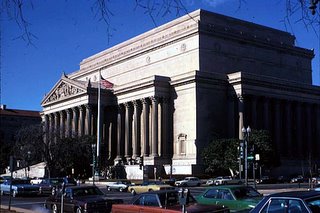
In what can be described as charitably as possible as trying to put the genie back in the bottle:
(I)ntelligence agencies have been removing from public access thousands of historical documents that were available for years, including some already published by the State Department and others photocopied years ago by private historians.
The restoration of classified status to more than 55,000 previously declassified pages began in 1999, when the Central Intelligence Agency and five other agencies objected to what they saw as a hasty release of sensitive information after a 1995 declassification order signed by President Bill Clinton. It accelerated after the Bush administration took office and especially after the 2001 terrorist attacks, according to archives records.
Most of this stuff is ancient:
But because the reclassification program is itself shrouded in secrecy, — governed by a still-classified memorandum that prohibits the National Archives even from saying which agencies are involved, — it continued virtually without outside notice until December. That was when an intelligence historian, Matthew M. Aid, noticed that dozens of documents he had copied years ago had been withdrawn from the archives' open shelves.Mr. Aid was struck by what seemed to him the innocuous contents of the documents, mostly decades-old State Department reports from the Korean War and the early cold war. He found that eight reclassified documents had been previously published in the State Department's history series, "Foreign Relations of the United States."
"The stuff they pulled should never have been removed," he said. "Some of it is mundane, and some of it is outright ridiculous."...
Among the 50 withdrawn documents that Mr. Aid found in his own files is a 1948 memorandum on a C.I.A. scheme to float balloons over countries behind the Iron Curtain and drop propaganda leaflets. It was reclassified in 2001 even though it had been published by the State Department in 1996.
Another historian, William Burr, found a dozen documents he had copied years ago whose reclassification he considers "silly," including a 1962 telegram from George F. Kennan, then ambassador to Yugoslavia, containing an English translation of a Belgrade newspaper article on China's nuclear weapons program.
Under existing guidelines, government documents are supposed to be declassified after 25 years unless there is particular reason to keep them secret. While some of the choices made by the security reviewers at the archives are baffling, others seem guided by an old bureaucratic reflex: to cover up embarrassments, even if they occurred a half-century ago.One reclassified document in Mr. Aid's files, for instance, gives the C.I.A.'s assessment on Oct. 12, 1950, that Chinese intervention in the Korean War was "not probable in 1950." Just two weeks later, on Oct. 27, some 300,000 Chinese troops crossed into Korea.
I find it impossible to imagine that the CIA's Security Operations Center, the office that investigates security violations, would have had any objection at this late date to having those fossilized documents in the open at the National Archives.
Monday, February 20, 2006
Administration Scrambles To Avoid Investigations

The Bush administration is doing everything it can to avoid being called to account for the extra-legal NSA warrantless eavesdropping program.
After two months of insisting that President Bush did not need court approval to authorize the wiretapping of calls between the United States and suspected terrorists abroad, the administration is trying to resist pressure for judicial review while pushing for retroactive Congressional approval of the program...
According to lawmakers involved in the discussions, a number of senior officials, including Harriet E. Miers, the White House counsel, and Andrew H. Card Jr., the chief of staff, began contacting members of the Senate to determine what it would take to derail the investigation.The White House has refused to discuss those talks. Trent Duffy, a deputy press secretary, said the administration "does not want to negotiate in the media."
The White House does not want to be held accountable for anything anywhere at any time.
Sunday, February 19, 2006
The Flight 93 Shoot Down
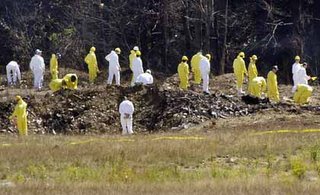
Vice-President Dick Cheney, who admitted having issued a "shoot-down" order for any hijacked planes coming toward the nation's capital on the morning of September 11, 2001, has long claimed that he was merely relaying the express authorization given to him by President Bush.
The new issue of Newsweek, online this morning, has a revealing bit of information buried six pages into a story about Cheney.
We now know why the government concocted the "lets roll" myth of the brave passengers forcing down Flight 93 over Pennsylvania.
People who were with the Vice-President on that morning say that, despite Cheney's testimony to the contrary to the 9-11 commission, he never got the required okay from President Bush to shoot down airliners.
Around 9:35 on the morning of 9/11, Cheney was lifted off his feet by the Secret Service and hustled into the White House bunker. Cheney testified to the 9/11 Commission that he spoke with President Bush before giving an order to shoot down a hijacked civilian airliner that appeared headed toward Washington. (The plane was United Flight 93, which crashed in a Pennsylvania field after a brave revolt by the passengers.) (sic) But a source close to the commission, who declined to be identified revealing sensitive information, says that none of the staffers who worked on this aspect of the investigation believed Cheney's version of events.
A draft of the report conveyed their skepticism. But when top White House officials, including chief of staff Andy Card and the then White House counsel Alberto Gonzales, reviewed the draft, they became extremely agitated. After a prolonged battle, the report was toned down. The factual narrative, closely read, offers no evidence that Cheney sought initial authorization from the president. The point is not a small one. Legally, Cheney was required to get permission from his commander in chief, who was traveling (but reachable) at the time. If the public ever found out that Cheney gave the order on his own, it would have strongly fed the view that he was the real power behind the throne.
It was worse than that, Newsweek is covering for the administration's real problem. It was not concern about "the real power behind the throne" that bothered the White House.
The big problem was that an Air National Guard unit shot down Flight 93 without the statutorily required authorization from the President. This is a scandal of monumental proportion.
This helps to explain why Bush and Cheney initially refused to establish a 9-11 commission, and when pressured to do so, why they insisted upon testifying together and without swearing an oath.
It also explains Defense Secretary Rumsfeld's "slip of the tongue" when he referred to "the people who shot down Flight 93 over Pennsylvania."
Saturday, February 18, 2006
Rumsfeld Hearts Info-Ops

In "the lady doth protest too much, methinks" department we find Defense Secretary Donald Rumsfeld whining about mainstream media coverage of defense issues and calling for better DOD information operations.
Defense Secretary Donald H. Rumsfeld yesterday called for the military and other government agencies to mount a far more aggressive, swift and nontraditional information campaign to counter the messages of extremist and terrorist groups in the world media.Rumsfeld criticized the absence of a "strategic communications framework" for fighting terrorism. He also lashed out at the U.S. media, which he blamed for effectively halting recent U.S. military initiatives in the information realm -- such as paying to place articles in Iraqi newspapers -- through an "explosion of critical press stories."
The speech follows a top-level review of Pentagon strategy and resources released earlier this month that concluded: "Victory in the long war ultimately depends on strategic communication." The Quadrennial Defense Review called for closing gaps in U.S. capabilities in what the Pentagon describes as "information operations," an area being reorganized in the Pentagon, according to current and former defense officials...
He also called for creating 24-hour media operations centers and "multifaceted media campaigns" using the Internet, blogs and satellite television that "will result in much less reliance on the traditional print press."
As if the "traditional print press" wasn't already fully compromised by their obsequious attitude towards power. The electronic corporate media is even closer, ask "Bomb" Woodruff.
Protests sparked by newspaper cartoons of the prophet Muhammad continued across (Pakistan) Friday, as a cleric announced a $1 million bounty for the killing of any of the Danish cartoonists responsible for the caricatures and Denmark temporarily closed its embassy.
Hundreds of protesters gathered in the capital, Islamabad, after midday prayers. Rallying at a downtown intersection, some chanted, "Bush is a dog!" and others carried banners reading, "Death sentence for the cartoonists." Police in riot gear watched from the sidelines. Similar demonstrations were reported in other cities across the country...
In the conservative northwestern city of Peshawar, Mohammed Yousaf Qureshi announced after Friday prayers at the historic Mohabat Khan mosque that the mosque and an affiliated religious school would give $25,000 and a car to anyone who killed one of the artists responsible for the cartoons, news agencies reported from the city.
The cleric also said a local jewelers' association had offered a $1 million bounty.
"If the West can place a bounty on Osama bin Laden" and his top deputy, Ayman Zawahiri, "we can also announce a reward for killing the man who has caused this sacrilege of the holy prophet," Qureshi told the Reuters news agency...
Political leaders from moderate as well as hard-line religious parties have vowed to continue the demonstrations, which have expanded beyond the cartoon controversy into a broader attack on Gen. Pervez Musharraf, Pakistan's president, and his Western backers, especially the United States.
Religious parties have announced plans for a large rally in the capital on Sunday as part of a series of demonstrations intended to peak when President Bush arrives on a visit in early March.
"They are pursuing a larger agenda against this regime under the cover of the cartoons," said Hasan Rizvi, a political analyst and author. "They want a confrontation now."
They aren't the only ones who "want a confrontation now."
Iran's foreign minister demanded the immediate withdrawal of British forces in Basra, saying that they had destabilized the southern Iraqi city near the Iranian border.
Basra is about 22 miles from a southern Iranian province that witnessed riots and bombings last year allegedly connected to Iran's Arab minority. Iran has blamed British intelligence for some of the bombings, a charge that Britain denies.
"The Islamic Republic of Iran demands an immediate withdrawal of British forces from Basra," Mottaki told reporters after talks with his Lebanese counterpart.
Mottaki's allegations seemed to be spurred by the recent publicity given to a video of what appeared to be British soldiers assaulting Iraqi boys after a street confrontation in January 2004 in the southern Iraqi city of Amarah, about 100 miles north of Basra. The British Army has launched an investigation and arrested two people.
And to think, Rumsfeld would like you to believe that the United States doesn't do information operations well.
Update: Indonesian Muslims are reacting according to plan.
Hundreds of Muslims protesting caricatures of the Prophet Muhammad tried to storm the U.S. Embassy on Sunday, smashing the windows of a guard post but failing to push through the gates. Several people were injured.
Abramoff Still Cooperating With Prosecutors

This blog's favorite lobbyist, Jack Abramoff, is still cooperating with prosecutors looking into the corrupt Republican machine.
The Justice Department and defense lawyers asked a federal judge Friday to delay the March sentencing of lobbyist Jack Abramoff in a Florida fraud case to allow him more time to cooperate in a broader government corruption investigation.Abbe Lowell, Abramoff's lawyer in Washington, said in a telephone conference with U.S. District Judge Paul C. Huck that if sentencing went forward as scheduled on March 16, it would be "upsetting to what's happening behind the scenes."
"It's based solely on the sensitivities of cooperation," Lowell said of the request.
I think that Abramoff should be allowed to take all the time he needs to implicate as many wrongdoers as possible.
Churchgoers Targeted By GOP

The Republican Party assumes that just because someone goes to church, they are likely to be dumb enough to vote for the GOP.
The North Carolina Republican Party asked its members this week to send their church directories to the party, drawing furious protests from local and national religious leaders."Such a request is completely beyond the pale of what is acceptable," said the Rev. Richard Land, head of the Ethics and Religious Liberty Commission of the Southern Baptist Convention.
During the 2004 presidential race, the Bush-Cheney campaign sent a similar request to Republican activists across the country. It asked churchgoers not only to furnish church directories to the campaign, but also to use their churches as a base for political organizing...
Officials of the Republican National Committee maintained that the tactic did not violate federal tax laws that prohibit churches from endorsing or opposing candidates for office, and they never formally renounced it. But Land said he thought the GOP had backed down.
Think again, Rev. Land.
Your good book talks a lot about sin and sinners.
They hadn't even heard of Republicans.
Cunningham Pre-Sentencing Memo Brings Bad News

Prosecutors are demanding that the book be thrown at disgraced former congressman Randy "Duke" Cunningham.
Convicted former representative Randy "Duke" Cunningham (R-Calif.) should be sentenced to the maximum 10 years in prison because of "unparalleled corruption" that included a "bribe menu" on congressional letterhead telling a defense contractor what payments were required for different levels of federal funding, federal prosecutors said in court papers yesterday.Cunningham pleaded guilty in November to bribery-related and tax-evasion charges of accepting $2.4 million from two contractors and two other men in return for steering defense work to them. The pre-sentencing memo filed by prosecutors in San Diego yesterday offered new details on the extent of his crimes and efforts he made to cover them up...
The 35-page memo detailed several other incidents, including several in which the government said Cunningham attempted to tamper with witnesses when he feared that his actions would be discovered...
Cunningham attempted to fabricate evidence and tamper with witnesses to his corruption, the government said, including persuading a real estate agent to write a letter justifying the lower price Wade resold his home for, and a phony letter in which Cunningham expressed his surprise at the low price and promised to pay Wade the difference.
He did not pay, the filing said.
Looks like the "Dukestir" is gonna pay now.
Friday, February 17, 2006
Whittington Leaves Hospital, Clearly Heavily Medicated

Vice President Dick Cheney's victim of last weekend's hunting accident, Harry Whittington, left the hospital today. Speaking to reporters, Mr. Whittington displayed the type of logic that serious painkillers have a way of imparting.
"We all assume certain risks in whatever we do, whatever activities we pursue. And regardless of how experienced, careful and dedicated we are, accidents do and will happen. And that's what happened last Friday." In fact, the hunting mishap occurred late Saturday afternoon.
As any accident investigator will tell you, accidents don't happen--they are caused.
"My family and I are deeply sorry for all that Vice President Cheney and his family have had to go through this past week," Whittington said. "We send our love and respect to them as they deal with situations that are much more serious than what we've had this week.
What happened to Cheney (and his family) that was more serious than getting shot? Maybe the Vice President's office is keeping something big from the public.
Administration Pressure On Senate Succeeds

The attempts by the architects of the extra-legal NSA warrantless eavesdropping program to forestall legal and political liability appears to be working.
The Bush administration helped derail a Senate bid to investigate a warrantless eavesdropping program yesterday after signaling it would reject Congress's request to have former attorney general John D. Ashcroft and other officials testify about the program's legality. The actions underscored a dramatic and possibly permanent drop in momentum for a congressional inquiry, which had seemed likely two months ago...
"It is more than apparent to me that the White House has applied heavy pressure in recent days, in recent weeks, to prevent the committee from doing its job," Sen. John D. Rockefeller IV (D-W.Va.), vice chairman of the intelligence committee, said after the panel voted along party lines not to consider his motion for an investigation.There was one setback, however, to the administration's efforts to keep tight wraps on the NSA operation. Yesterday, a federal judge ordered the Justice Department to turn over its internal documents and legal opinions about the program within 20 days -- or explain its reasons for refusing.
The explanation from the administration will doubtlessly be "tough shit."
Chairman Pat Roberts (R-Kan.) told reporters: "The administration is now committed to legislation and has agreed to brief more intelligence committee members on the nature of the surveillance program. The details of this agreement will take some time to work out."
Democrats said the administration's overture is so vague that it amounts to nothing, calling it a stalling tactic to give Republican lawmakers political cover for rejecting a full inquiry. "For the past three years, the Senate intelligence committee has avoided carrying out its oversight of our nation's intelligence programs whenever the White House becomes uncomfortable with the questions being asked," Rockefeller told reporters. "The very independence of this committee is called into question."
The House of representatives wants to look like it is exercising its constitutional oversight as well:
In the House, the intelligence committee will ask administration officials to explain the NSA program and its legal justifications in closed hearings over the next few months, said Wilson, one of its subcommittee chairmen.
The committee "has begun a process to thoroughly review this program and the FISA law" through a series of yet-to-be-scheduled briefings and exchanges of letters that will unfold as part of the panel's "regular order," Wilson said in an interview in her office. "This is the way we do oversight," she said, adding that she has discussed the matter with the committee chairman, Peter Hoekstra (R-Mich.).
Wilson indicated that the House hearings will not have the sharply investigative tone that Rockefeller sought in his motion, which would have required the administration to detail its reasons and rationale for starting the surveillance program in late 2001.
On another front in the increasingly futile attempt to call the administration to account for the NSA wiretap scheme, perhaps a glimmer of hope:
In a victory for three privacy advocacy groups seeking Justice Department records about the program, U.S. District Judge Henry H. Kennedy Jr. ruled yesterday that the department cannot decide on its own what documents it will provide, because news reports in December revealing the program's existence have created a substantial public dialogue about presidential powers and individual privacy rights. Kennedy rejected Justice's argument that, because so much of the surveillance program involves classified information, the agency alone can determine when it is feasible to review and possibly release documents...
The American Civil Liberties Union, which had requested the records under the Freedom of Information Act along with the Electronic Privacy Information Center and the National Security Archive Fund, cheered the ruling.
Kennedy agreed with the three groups that the Justice Department's decision to set its own time frame "would give the agency unchecked power to drag its feet and 'pay lip service' " to the law requiring the release of public information.
The Bush administration knows full well that this stalling tactic will dilute the already pathologically short attention span of the American public.
The spying controversy will soon become not such a big deal.
The people will have been lulled back to sleep, and the theft of the nation's riches (both material and other) can continue as per plan.
Nothing To See Here, Folks

In the "move along folks, nothing to see here" department we find "Texas Justice" living up to it's reputation.
The sheriff's department responsible for investigating Vice President Cheney's shooting of a Texas lawyer has closed its investigation and decided no criminal charges are warranted, according to a report released Thursday...
The report, written by Chief Deputy Gilbert San Miguel Jr., quotes Cheney and Whittington as saying the shooting was an accident. They said no one was drinking alcohol during the hunt, according to the report...
Hospital officials have declined to say whether Whittington was given a blood alcohol test when he was admitted.In his first public comments on the shooting, President Bush said Thursday in Washington that he is satisfied with Cheney's account of what happened. "I thought the vice president handled the issue just fine," he said. "I'm satisfied with the explanation he gave."
What else could Bush say? Although some unattributed reports out of the White House claim that the president is furious with the way Cheney handled the incident.
The sheriff's 2 1/2 -page report says that San Miguel began his investigation at the Armstrong Ranch at 8 a.m. Sunday, 14 1/2 hours after the shooting occurred...
Standing on a small hill, Cheney fired down, spraying Whittington's face, neck and chest with birdshot. "Cheney told me the reason Harry Whittington sustained the injuries to his face and upper body," the report said, "was that Mr. Whittington was standing on ground that was lower than the one he was standing on."...
The incident has been a big topic among the many hunters and gun enthusiasts in this region. Ken Tuggle, manager of the Corpus Christi Pistol & Rifle Club, said he could not believe that a blast at 30 yards from a 28-gauge shotgun, which shoots fewer pellets and has a smaller shot pattern than a 12-gauge shotgun, could pass through a hunting jacket and a shirt and that the pellets could become embedded near a victim's heart. "It's hard to fathom," he said...
Other hunters questioned why Cheney was shooting down at a flying bird. "The idea behind quail hunting is that you have to hit the quail when it's about five to 10 feet in the air," said Wade Wilson, a South Texas hunting guide. "Quail don't fly very high. But nobody should be shooting down."
The understatement of the day.
Roberts Wants To Broaden Leak Law

The odious Pat Roberts (R-Kan.) is thinking about broadening the laws against leaks of classified information to reporters.
The chairman of the Senate Select Committee on Intelligence said yesterday that he may add language to the fiscal 2007 intelligence authorization bill to criminalize the leaking of a wider range of classified information than is now covered by law. He indicated the new measure would be similar to legislation vetoed by President Bill Clinton more than five years ago.
The leak of the NSA warrantless wiretap program to the New York Times, and the disclosure of the CIA secret prisons in Eastern Europe to the Washington Post, must really exasperate the old Republican codger.
Recalling the legislation Clinton vetoed, Roberts said, "Whether it's a reporter or just any individual or somebody by the water cooler who's upset or somebody who has just a very strong difference of opinion knowingly reveals classified information, that would be a felony."Since the Clinton veto, he added, "I think times have changed, and we may be introducing that in the intelligence authorization bill."...
Clinton vetoed a measure by Sen. Richard C. Shelby (R-Ala.) that would have broadened the law that criminalizes release of "national defense information."Civil liberties groups and news organizations, which argued that the legislation would chill their ability to get information from officials, lobbied for the veto, which Clinton exercised in 2000.
In 2002, with George W. Bush in the White House, Shelby reintroduced his language, but then-Attorney General John D. Ashcroft said that "rigorous investigation" and enforcement of existing laws -- not new legislation -- were the best way to fight leaks.
The recent AIPAC case appears to be part of the impetus for the new anti-leak push.
A lawyer familiar with the AIPAC case said administration officials "want this case as a precedent so they can have it in their arsenal" and added: "This as a weapon that can be turned against the media."
The media in this country is already subservient to a very large degree to the whims of the government, despite wing-nut claims to the contrary.
Leaks exposing egregious wrongdoing and blatant illegalities are the only way that the few people who still care about the United States can keep an eye upon the malefactors who have hijacked the nation.
The intentional attempts via legislation to dry up of this trickle of information means that the lawmakers who try to do this are co-conspirators in the crimes of the Bush administration.
Gonzales Recusal Asked By Democrats
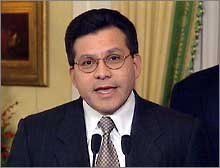
The meddlesome Democrats are requesting that Attorney General Abu Gonzales recuse himself from any involvement in the Jack Abramoff lobbying cases.
Justice says there is no need.
Thirty-one Democratic senators said Gonzales's close ties to the White House could create a conflict of interest as the Justice Department examines lobbyist Jack Abramoff's dealings with government officials.Gonzales previously served as the White House's top lawyer.
"Given the possible ties between Mr. Abramoff and senior government officials with whom you are familiar and to whom you may have provided legal advice, you will avoid the appearance of a conflict if you recuse yourself now," the senators said in a letter.
A Justice Department official said Gonzales does not need to recuse himself because the investigation is being handled by experienced lawyers serving in nonpolitical posts.
Hell, if Gonzales had to recuse himself from every issue in which he provided dodgy legal advice to the administration he would be on a paid vacation 24/7.
NASA Working To End Political Censorship

NASA is continuing to try to clean up it's act and dispense with political minders dictating what scientific data and conclusions get disseminated to the press.
NASA Administrator Michael D. Griffin said yesterday he has convened a team of scientists and public information officials to draft new guidelines to ensure that news of agency research or events will not be tailored or curtailed to reflect political or ideological bias.In his clearest statement yet regarding accusations that NASA public relations officials had manipulated news releases or reports involving climate change and cosmology, Griffin told reporters that "it is not appropriate for scientists to be required to adjust, spin or alter their scientific work to fit any particular political agenda."...
Although (Science Committee Chairman Sherwood L.) Boehlert (R-N.Y.) and other House members mentioned NASA's public information difficulties in opening statements, they asked Griffin no questions about the accusations that arose in January when scientist James E. Hansen charged that the agency's press office was restricting his efforts to publicly discuss climate change.
In response to Hansen's assertions, Griffin earlier this month e-mailed employees vowing to respect scientific openness. On Feb. 10, NASA spokesman George C. Deutsch, a political appointee, resigned after allegations he had edited a scientist's press release on cosmology to conform to administration views.
Griffin told reporters after yesterday's hearing that he has made it a policy that "technical people within NASA are not only allowed to speak their minds . . . we beg them to speak their minds."
Philippine Overthrow Plot Uncovered

Coups d'Etat are one of the most conspicuous types of political skullduggery.
The Philippine government and armed forces said they were containing a plot to overthrow and perhaps even kill President Gloria Macapagal Arroyo by fugitive mutineers backed by retired officers and opposition figures."Everything is under control," Col. Tristan Kison, the armed forces spokesman, said on the radio Friday. He said extra security was in place and the justice department was investigating.
"We discovered that there are some who are recruiting, but I cannot tell you who they are," he said. "Knowing and proving are different things."
Last year, Arroyo survived a political crisis, including an impeachment attempt, over allegations of vote-rigging and corruption. Security concerns are also running high as the country celebrates the 20th anniversary of the Feb. 25 "people power" revolt that ousted dictator Ferdinand Marcos.
A mudslide triggered by two weeks of heavy rain crashed through a village in the central Philippines on Friday, leaving about 1,500 people missing and hundreds feared dead...
Rescue workers were particularly alarmed about the fate of students at the elementary school in Guisahugon village, which was in session when a swath of the nearby mountainside collapsed at about 9 a.m. Officials said they believed about 200 youngsters were inside along with their principal and six teachers.
The landslide leveled most of the surrounding community, burying at least 350 homes and leaving only a few twisted chunks of corrugated metal poking above the mud, which emergency workers said was up to 30 feet deep in some places. Two other nearby villages were also damaged...
When rescue efforts were suspended at nightfall because of darkness and a continuing downpour, emergency teams had retrieved only 23 victims. The Red Cross reported that about 1,500 people were unaccounted for...
The Philippines is frequently buffeted by floods and heavy rain, especially typhoons that pound the archipelago on an average of 20 times a year. A string of storms in 2004 left 1,800 people dead or missing in an area northeast of Manila.
Thursday, February 16, 2006
Cheney Attempts To Put Controversy Behind Him

Vice President Cheney has carefully cultivated a reputation as the "strong, silent type." He may have missed his true calling. Cheney should have been a comedian.
The vice president rejected critics, including Republicans, who said the incident should have been announced promptly by the White House, rather than by the ranch owner calling a friendly local reporter the next day. "I thought that made good sense because you get as accurate a story as possible from somebody who knew and understood hunting," he said, adding: "And I thought that was the right call. . . . I still do."
A master of ironic humor at work.
His (nominal) boss may not be too happy with the recent developments:
In a sign of the extraordinary tension inside the White House -- evidently even between Bush and Cheney -- McClellan noted that when he said at a Monday briefing that he would have handled disclosure of the shooting differently, he was "speaking on behalf of the White House and the president."
Cheney's victim is not your typical gooper:
Whittington's politics, according to friends, have not always conformed with the conservative ideology of many Texas Republicans. One Texas Republican described Whittington's politics as that of a Rockefeller Republican, not a Reagan Republican. Others cited Whittington's opposition to the death penalty as an example of his ideological independence.
It is no secret why Cheney chose the compliant Brit Hume for the exclusive interview, he is an apologist tool for the administration:
Hume has questioned the recent behavior of the White House press corps, telling viewers Tuesday: "It doesn't seem to me, from what I can tell, from what I'm reading from the public, that the public much cares about whether they found out about this on Saturday night or Sunday afternoon or Monday morning."
Cheney was not eager to discuss another big liability, his role in "Plamegate":
Vice President Cheney yesterday praised his former chief of staff, I. Lewis "Scooter" Libby, and said the indicted ex-aide deserves to be considered not guilty until proved otherwise. But the vice president declined to say whether he authorized Libby to disclose classified information...Cheney is juggling so many crises now that his poor ticker must be under a heck of a strain. His cardiologist must be hating life right about now
In the interview, Cheney said he had the power under a presidential executive order to declassify information. "I've certainly advocated declassification and participated in declassification decisions," he said, but he would not say whether he had done so unilaterally.Cheney was referring to an executive order on classification of information first signed by President Bill Clinton in 1995. In March 2003, just days after ordering U.S. troops into Iraq, President Bush amended order to, among other things, give the vice president the same classification power as the president.
DeLay Keeps in Touch With His Constituents

Good lawmakers make a practice of keeping in touch with the folks back home, their constituents.
Rep. Tom DeLay (R-Tex.) has sent an eight-page handwritten letter to constituents, asking for their vote in his upcoming primary election and defending his dealings with former lobbyist Jack Abramoff.The letter, dated Feb. 6, was sent to thousands of potential Republican voters. It asserted that DeLay's indictment by a state grand jury on charges related to campaign funding "was about partisan politics . . . plain and simple" and that the conspiracy alleged "never occurred."
Those nefarious "conspiracy theorists" are always trying to wreck things for the rest of us.
DeLay said trips he took with Abramoff between 1997 and 2000 to Russia, the Northern Mariana Islands and the United Kingdom were proper, and said they had a "common thread" -- they were about "exporting the principles of American free enterprise, religious freedom and democracy."
I'm not entirely sure that Tom DeLay is the best emissary of American values to be sending anywhere, let alone overseas.
Justice Dept. Role in NSA Program Investigated
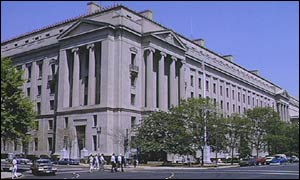
An investigation being portrayed as "routine" is being conducted by the Justice Department into it's own role in the extra-legal NSA warrantless eavesdropping program.
We again venture into the "fox investigating what happened to the chickens in the henhouse" labyrinth with this action.
The Justice Department's Office of Professional Responsibility has opened an internal investigation into the department's role in approving the Bush administration's warrantless domestic eavesdropping program, officials said yesterday...
In a letter to Rep. Maurice D. Hinchey (D-N.Y.), Office of Professional Responsibility counsel H. Marshall Jarrett said that his office has "initiated an investigation" into the Justice Department's role in the NSA surveillance program. The letter, dated Feb. 2 but not received by Hinchey until yesterday, indicates that the probe will include "whether such activities are permissible under existing law."But Justice Department spokeswoman Tasia Scolinos said the inquiry will be more limited: "They will not be making a determination on the lawfulness of the NSA program but rather will determine whether the department lawyers complied with their professional obligations in connection with that program."
Scolinos also said that "OPR routinely looks into issues of this kind."
In addition, Attorney General Alberto R. Gonzales signaled in an interview with The Washington Post yesterday that the administration will sharply limit the testimony of former attorney general John D. Ashcroft and former deputy attorney general James B. Comey, both of whom have been asked to appear before the Senate Judiciary Committee regarding the program.
"Clearly, there are privilege issues that have to be considered," Gonzales said.
Well, the White House betrayed no concern about "privilege issues" when they sent Gonzales himself to testify last week to the Judiciary Committee.
Maybe they knew that Gonzales would keep to the script.
In response to the comments last night, Senate Judiciary Committee Chairman Arlen Specter (R-Pa.) said he has asked Gonzales for permission to call Ashcroft and Comey to testify but has not received an answer.
Meanwhile, Gonzales continues to prove why he was such a good choice to be this administration's AG:
Attorney General Alberto R. Gonzales unveiled a series of initiatives yesterday aimed at combating child exploitation, housing discrimination and gang violence, saying that the Justice Department's continued focus on preventing terrorism should not detract from other pressing problems.
He's our man, dealing squarely with all the controversial issues.
"Pressing" too.


